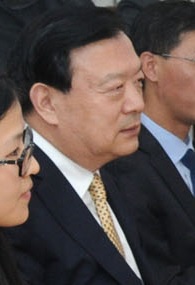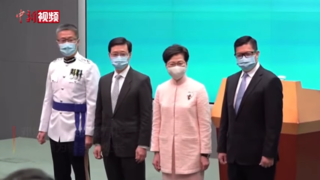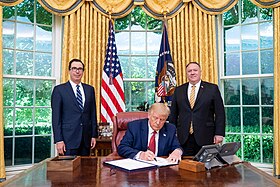A public security bureau (PSB) (Chinese: 公安局; pinyin: gōng'ānjú) of a city or county, or public security department (PSD) (Chinese: 公安厅; pinyin: Gōng'āntīng) of a province or autonomous region, in the People's Republic of China refers to a government office essentially acting as a police station or a local or provincial police; the smallest police stations are called police posts (Chinese: 派出所; pinyin: pàichūsuǒ). The PSB/PSD system is similar in concept to the Japanese kōban system, and is present in each province and municipality. Typically, a PSB/PSD handles policing, public security, and social order. Other duties include residence registration ("hukou") and internal and external migration matters, such as the registration of temporary residents (including both foreign and domestic visitors).

The United States-Hong Kong Policy Act, or more commonly known as the Hong Kong Policy Act or Hong Kong Relations Act, is a 1992 act enacted by the United States Congress. It allows the United States to continue to treat Hong Kong separately from Mainland China for matters concerning trade export and economic control after the 1997 Hong Kong handover.

Hong Kong–United States relations are bilateral relations between Hong Kong and the United States.

Eric Chan Kwok-ki is a Hong Kong politician who is the incumbent Chief Secretary for Administration since 1 July 2022. He was also the secretary-general of the Committee for Safeguarding National Security (2020–2022). Previously, he served as Director of the Chief Executive's Office (2017–2022) and Director of Immigration (2011–2016).

The Magnitsky Act, formally known as the Russia and Moldova Jackson–Vanik Repeal and Sergei Magnitsky Rule of Law Accountability Act of 2012, is a bipartisan bill passed by the U.S. Congress and signed into law by President Barack Obama in December 2012, intending to punish Russian officials responsible for the death of Russian tax lawyer Sergei Magnitsky in a Moscow prison in 2009 and also to grant permanent normal trade relations status to Russia.

Xia Baolong is a Chinese politician. Originally from Tianjin, Xia began his political career in the Communist Youth League. He served as the vice mayor of Tianjin, governor and Communist Party Secretary of Zhejiang province. Between 2018 and 2023, he served as a vice chairman of the 13th Chinese People's Political Consultative Conference (CPPCC), being its secretary general from 2018 to 2020. Xia was appointed director of the Hong Kong and Macau Affairs Office in February 2020.

Luo Huining is a senior member of the Chinese Communist Party who was the director of the Liaison Office of the Central People's Government in Hong Kong between 2020 and 2023. A native of Yiwu, Zhejiang, he was previously the Governor, then Party Secretary of Qinghai province before being appointed Party Secretary of Shanxi province.

Zhang Xiaoming is a Chinese politician. He was the director of the Liaison Office of the Central People's Government in Hong Kong and then of the Hong Kong and Macau Affairs Office, before being demoted to deputy director of the latter due to the 2019–2020 Hong Kong protests.

Stephen Lo Wai-chung is a Hong Kong retired law enforcement administrator. Lo joined the Hong Kong Police Force in 1984 after his graduation from the University of Hong Kong with a bachelor of social science in management. He served as the Commissioner of Police of Hong Kong from 2015 to 2019, Deputy Commissioner of Police (Management) from 2014 to 2015, Deputy Commissioner of Police (Operations) from 2013 to 2014, and Senior Assistant Commissioner of Police from 2011 to 2013.

John Lee Ka-chiu is a Hong Kong politician and former police officer who is the fifth and current Chief Executive of Hong Kong.

Erick Tsang Kwok-wai is a Hong Kong government official. Since 2020, he has been Secretary for Constitutional and Mainland Affairs, one of the principal officials of Hong Kong. Prior to that, he was Director of Immigration.

The Law of the People's Republic of China on Safeguarding National Security in the Hong Kong Special Administrative Region is a national law of China on Hong Kong national security passed in 2020. It is implemented in Hong Kong in accordance with Hong Kong Basic Law Article 18, which allows for China's national laws to be valid in Hong Kong if they are included in Annex III. It was formulated under the authorization of the National People's Congress decision on Hong Kong national security legislation. The law was passed on 30 June 2020 by the Standing Committee of the National People's Congress as a means of resolving the anti-extradition bill protests instigated by a Hong Kong local bill proposed in 2019 to enable extradition to other territories including the mainland, and came into force the same day.

In early May 2020, the Chinese Government announced plans to draft a new national security law for Hong Kong, something required under Hong Kong Basic Law but which should explicitly be written and enacted by Hong Kong's own government. In response to apparent mainland intent to bypass Hong Kong's local legislature, the United Kingdom – which administered Hong Kong until 1997 – announced that if a security law drafted by China was approved, Britain would open a route for all Hong Kong residents born under British rule to become British citizens. Other nations and organisations have given various responses to the decision, to legislation plans, and ultimately the law itself as passed by the Chinese Standing Committee of the National People's Congress on 28 May 2020 with 2878 votes "for", 1 vote against, and 6 blank votes. At 9:30 am, 30 June 2020, the same Standing Committee unanimously voted to enact the law. The law became effective at 11 pm on the same day.

The Office for Safeguarding National Security of the Central People's Government of the People's Republic of China in the Hong Kong Special Administrative Region (OSNS) is the Chinese central government's national security office in Hong Kong. The office was established in July 2020 by the Hong Kong national security law.

Zheng Yanxiong is a Chinese politician currently serving as director of the Hong Kong Liaison Office and secretary of the Hong Kong Work Committee of the Chinese Communist Party. Previously, he was the director of the Office for Safeguarding National Security of the CPG in the HKSAR. Zheng is known for controversial statements denouncing foreign media reporting on the Wukan protests in Shanwei in 2011, and for the crackdown of renewed protests in Shanwei in 2016.

The Committee for Safeguarding National Security of the Hong Kong Special Administrative Region is a national security committee established by the Government of Hong Kong under the Article 12 of the Hong Kong national security law. The committee is supervised and accountable to the Central People's Government of China.

The Hong Kong Autonomy Act is legislation passed by the United States Congress following the enactment in June 2020 by the Chinese Standing Committee of the National People's Congress of the Hong Kong national security law.

The month of August 2020 in the 2019–2020 Hong Kong protests saw only sparse and relatively small protests, mainly due to the city going through a third wave of the COVID-19 pandemic and an outdoor gathering ban on groups of more than two people. As the impact of the Hong Kong National Security Law on the city became increasingly evident, and additionally in response to acts by representatives of the local and mainland governments throughout the protests, Western democracies continued to voice sharp criticism and implemented sanctions against China, with the United States imposing sanctions on 11 Hong Kong officials on 7 August. These developments supported the opinion expressed by former British Foreign Secretary Malcolm Rifkind in late June that the protests had morphed from a mostly local dispute into an international one.
The United States government applies economic sanctions against certain institutions and key members of the Chinese government and its ruling Chinese Communist Party (CCP), certain companies linked to the People's Liberation Army (PLA), and other affiliates that the US government has accused of aiding in human rights abuses. The US maintained embargoes against China from the inception of the People's Republic of China in 1949 until 1972. An embargo was reimposed by the US following the 1989 Tiananmen Square protests and massacre. From 2020 onward, the US imposed sanctions and visa restrictions against several Chinese government officials and companies, in response to the persecution of Uyghurs in China, human rights abuses in Hong Kong and Tibet, military-civil fusion, support for the Russian invasion of Ukraine, and fentanyl production.

Hong Kong Executive Council was reshuffled from 24 to 25 June 2021, the second in the chief executive term of Carrie Lam, and the first after National Security Law was imposed. John Lee, the Secretary for Security and a former police, was promoted to Chief Secretary.

















